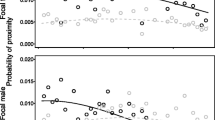Abstract
Grooming relations in mother-offspring pairs of rhesus monkeys living in social group A on Cayo Santiago were studied over a 24-month period. The general pattern of grooming relations indicated that (1) up to the age of 3 years, there was no difference in the amount of grooming performed by mothers on their daughters vs. their sons; (2) from age 3–6 years, mothers groomed their daughters more than they groomed their sons; and (3) from the yearling stage through age 5 years, daughters groomed their mothers more than sons groomed their mothers. The maternal-offspring bond, as reflected by measures of grooming frequency, persists into the adult life of the offspring. This study confirms previously reported findings regarding the importance of kinship as a determinant of grooming relations.
Similar content being viewed by others
References
Bernstein, I., and Mason, W. (1963). Activity patterns of rhesus monkeys in a social group.Anim. Behav. 11: 455–460.
Bernstein, I., and Sharpe, L. G. (1966). Social roles in a rhesus monkey group.Behaviour 26: 91–104.
Furuya, Y. (1965). Grooming behavior in wild Japanese monkeys. In Altmann, S. A. (ed.),Japanese Monkeys.
Harlow, H. F. (1962). The heterosexual affectional system in monkeys.Am. Psychologist, 1–9.
Hinde, R. A., and Spencer-Booth, Y. (1967). The behaviour of socially living rhesus monkeys in their first two and a half years.Anim. Behav. 15: 169–196.
Hinde, R. A., Rowell, T., and Spencer-Booth, Y. (1964). Behaviour of socially living rhesus monkeys in their first six months.Proc. Zool. Soc. Lond. 143: 609–649.
Lindburg, D. G. Grooming as a regulator of social interactions in rhesus monkeys. In Carpenter, C. R. (ed.),Behavior Regulators of Behavior in Primates, Bucknell University Press, Lewisburg, Pa. (in press).
Marler, P. (1965). Communication in monkeys and apes. In Southwick, C. H. (ed.),Primate Social Behavior Holt, New York.
Miller, M., Kling, A., and Dicks D. (1972). Familial relations of male rhesus monkeys in a semi-freeranging troop. Paper presented at the Fourth International Congress of Primatology, August 1972, Portland, Oregon.
Mitchell, G. D. (1968). Attachment differences in male and female infant monkeys.Child Develop. 39: 611–620.
Sade, D. S. (1965). Some aspects of parent-offspring and sibling relations in a group of rhesus monkeys, with a discussion of grooming.Am. J. Phys. Anthropol. 23: 1–18.
Southwick, C. H. (1967). An experimental study of intragroup agonistic behavior in rhesus monkeys (Macaca mulatta).Behaviour 28: 182–209.
Sparks, J. (1967). Allogrooming in primates: A review. In Morris, D. (ed.),Primate Ethology Aldine, Chicago.
Varley, M. A., and Symmes, D. (1966). The hierarchy of dominance in a group of macaques.Behaviour 27: 54–75.
Author information
Authors and Affiliations
Additional information
Research grant support from the National Institutes of Health, National Institute of Neurological Disease and Stroke, Laboratory of Perinatal Physiology, San Juan, Puerto Rico. Conducted in the Section of Primate Ecology, Cayo Santiago, Puerto Rico, and The Rockefeller University, New York.
Rights and permissions
About this article
Cite this article
Missakian, E.A. Mother-offspring grooming relations in rhesus monkeys. Arch Sex Behav 3, 135–141 (1974). https://doi.org/10.1007/BF01540997
Issue Date:
DOI: https://doi.org/10.1007/BF01540997




